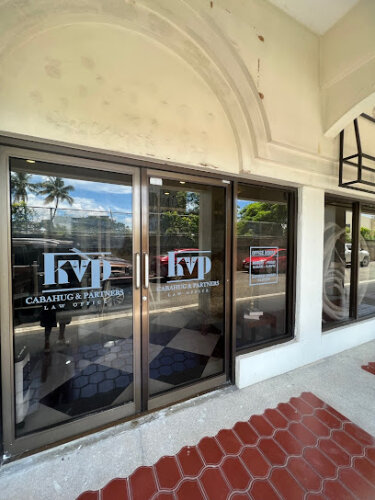Best Lawyers in Cebu City
Share your needs with us, get contacted by law firms.
Free. Takes 2 min.
List of the best lawyers in Cebu City, Philippines
Philippines Legal Questions answered by Lawyers
Browse our 272 legal questions in Philippines and read the lawyer answers, or ask your own questions for free.
- Pamangkin ko po ay may barkada na nakaw sa 7/11 tapos nahuli.. pero wala po syang ka alam alam na yung barkada nya ay nag nakaw na sa timena sila ay mag kasama ngayun sya po ay nadamay pinag usapan po sa baranggay na kong hindi mag babayad ng danyus ang m
- Pwede po ba ang napag kasunduan na sya ang ikukulong o pag babayarin kahit na sya ay nadamay lamang at walang alam?
-
Lawyer answer by NARAG LAW OFFICE
Magandang araw po. Kung ang pamangkin ninyo ay walang kaalaman at hindi siya nakisali sa pagnanakaw, hindi siya dapat basta managot o makulong. Sa batas, kailangan mapatunayan na may partisipasyon o kasabwat siya sa krimen bago siya maging liable. Ang...
Read full answer - Receiving unsolicited private photos of myself via email – possible extortion / privacy violation
- I am a content creator based in the Philippines and seeking legal guidance regarding a serious privacy violation. A former intimate partner informed me that he sold my private intimate photos to another person without my consent. These photos were originally shared privately between two consenting adults, but I never... Read more →
-
Lawyer answer by NARAG LAW OFFICE
I'm sorry this happened to you. Based on Philippine law, what you described can already constitute a crime even if the photos have not yet been publicly posted. To properly evaluate your case, please send us copies of any court...
Read full answer - Receiving unsolicited private photos of myself via email – possible extortion / privacy violation
- I am a content creator based in the Philippines and seeking legal guidance regarding a serious privacy violation. A former intimate partner informed me that he sold my private intimate photos to another person without my consent. These photos were originally shared privately between two consenting adults, but I never... Read more →
-
Lawyer answer by NARAG LAW OFFICE
I'm sorry this happened to you. Based on Philippine law, what you described can already constitute a crime even if the photos have not yet been publicly posted. To properly evaluate your case, please send us copies of any court...
Read full answer
Philippines Legal Articles
Browse our 19 legal articles in Philippines written by expert lawyers.
- Legal Guide to Last Wills and Testaments in the Philippines
- Legal Guide to Last Wills and Testaments in the Philippines A last will and testament is a legal document that dictates how your assets will be distributed after your death, governed strictly by the Civil Code of the Philippines. Creating a legally valid will ensures your loved ones are protected,... Read more →
- Managing Labor Inspections for BPOs in the Philippines
- Managing Labor Inspections for BPO Companies in the Philippines The Department of Labor and Employment (DOLE) conducts unannounced inspections to verify compliance with General Labor Standards and Occupational Safety and Health standards. BPO companies must maintain meticulous payroll records covering the past three years to prove payment of night shift... Read more →
- Set Up a Foreign-Owned Corporation in the Philippines
- Setting Up a Foreign-Owned Domestic Corporation in the Philippines Key Takeaways Foreign investors can successfully incorporate and operate within the Philippine market by following highly structured national and local regulations. Successfully establishing your business requires understanding foreign ownership limits, meeting specific capital requirements, and navigating multiple government agencies. The Foreign... Read more →
About Hiring a Lawyer in Cebu City, Philippines
Hiring a lawyer in Cebu City, Philippines, involves several steps, including identifying the right type of lawyer for your legal needs, assessing their expertise and credibility, and understanding the legal fees involved. Cebu City has a vibrant legal community with professionals specializing in various fields of law, including family law, criminal law, real estate, corporate law, and labor law. It's essential to consult with a licensed attorney who is a member of the Integrated Bar of the Philippines, which is the official organization of all Philippine lawyers.
Why You May Need a Lawyer
There are numerous situations where hiring a lawyer in Cebu City might be necessary. These situations include handling family-related matters such as annulments or child custody, dealing with criminal charges, negotiating contracts, addressing property disputes, starting or managing a business, and drafting legal documents. A lawyer's expertise can be invaluable in navigating the complexities of local laws and ensuring your rights are protected.
Local Laws Overview
Cebu City's legal framework is governed by the laws of the Philippines, with local ordinances adding another layer of regulation. Key aspects relevant to legal professionals in Cebu City include family law, which is particularly important given cultural considerations in the Philippines; property law, as real estate transactions can be complex; and business law, as Cebu City is a significant commercial hub. Additionally, understanding labor laws is crucial due to the city's robust employment sector.
Frequently Asked Questions
What should I consider when choosing a lawyer in Cebu City?
Consider the lawyer’s specialization, track record, approachability, and fee structure. Make sure they are in good standing with the Integrated Bar of the Philippines.
How do I verify a lawyer's credentials in Cebu City?
You can verify a lawyer's credentials by checking with the Integrated Bar of the Philippines and reviewing their professional history and client reviews.
What are typical legal fees in Cebu City?
Legal fees in Cebu City can vary widely based on the complexity of the case and the lawyer’s experience. Some lawyers may charge hourly rates, while others may offer fixed fees for specific services.
Can I get free legal assistance in Cebu City?
Yes, some organizations and government agencies offer free legal aid, especially for indigent individuals. Consider contacting the Public Attorney's Office (PAO) for assistance.
Is it necessary to have a lawyer for property transactions in Cebu City?
While not legally required, it is highly advisable to have a lawyer to ensure all legal aspects of the transaction are properly handled.
How do I handle a legal dispute in Cebu City?
It is best to consult with a lawyer to understand your options, which may include negotiation, mediation, or pursuing litigation through the courts.
What is the role of notaries in Cebu City?
Notaries in Cebu City authenticate documents and can administer oaths. They are licensed lawyers who offer additional services related to document verification.
Can a lawyer from another city represent me in Cebu City?
Yes, a lawyer from anywhere in the Philippines can represent you in Cebu City, provided they understand the local laws and regulations applicable to your case.
How long does it take to resolve a legal case in Cebu City?
The duration of legal cases in Cebu City varies significantly depending on the complexity of the case and the efficiency of the legal system.
Are there specialized courts in Cebu City?
Cebu City has various courts, including regional trial courts, municipal trial courts, and courts focused on specific matters like family or commercial cases.
Additional Resources
For those seeking legal advice or assistance in Cebu City, several resources are available:
- Official Government of the Philippines Portal
- Integrated Bar of the Philippines - Cebu Chapter
- Public Attorney's Office (PAO) for free legal aid
- Local government units and barangay halls for community legal assistance
Next Steps
After identifying the need for legal assistance, the following steps can help you proceed effectively:
- Define your legal issue clearly to determine whether you need a lawyer.
- Research and list potential lawyers who specialize in your area of need.
- Contact them to discuss your case and inquire about their services and fees.
- Choose a lawyer you feel comfortable with and who meets your requirements effectively.
- Follow their guidance, provide necessary documentation, and stay engaged in the legal process.
Seeking legal help can be daunting, but with the right approach and resources, it can be a straightforward process.
Lawzana helps you find the best lawyers and law firms in Cebu City through a curated and pre-screened list of qualified legal professionals. Our platform offers rankings and detailed profiles of attorneys and law firms, allowing you to compare based on practice areas, experience, and client feedback.
Each profile includes a description of the firm's areas of practice, client reviews, team members and partners, year of establishment, spoken languages, office locations, contact information, social media presence, and any published articles or resources. Most firms on our platform speak English and are experienced in both local and international legal matters.
Get a quote from top-rated law firms in Cebu City, Philippines — quickly, securely, and without unnecessary hassle.
Disclaimer:
The information provided on this page is for general informational purposes only and does not constitute legal advice. While we strive to ensure the accuracy and relevance of the content, legal information may change over time, and interpretations of the law can vary. You should always consult with a qualified legal professional for advice specific to your situation.
We disclaim all liability for actions taken or not taken based on the content of this page. If you believe any information is incorrect or outdated, please contact us, and we will review and update it where appropriate.
Refine your search by selecting a practice area.




































